THE YEOMANRY "REDUCED."
" OF all the forces that belong to this country, the Yeomanry corps are the most constitutionid "—such is the dictum of that great authority the Earl of WistettissEs. And his Lordship probably arrived at that opinion by a very short road, lie may be snprosed to have reasoned thus. "There are three estates in this realm ; but the Aristocracy and their connexions have the predominance, and ought to have it : this is the essence of the British constitution. Does an act or an institution tend to the homer and profit of myself and my order, with its various rami-
difference is caused by certain expected appropriations in aid,—though any per- son who tries will have considerable difficulty in working it out. The accounts are vet y puzzfing. t As au increase is now said to be uncertain, the better mode would have been to have taken a separate vote for ti.c larAest sum likely to be wanted. upon the iv.derstanidng to sender a tiLeeial account, With the present House of
Commeus, we will not affect to say that this have snide any different e in the lung run; but it would line been a lore businessdike mode of statting. fications ? If it does, unquestionably it is constitutional: if the reverse, it is Jacobinical, Radical, levelling, dangerous to Church and State—in a word unconstitutional. Now the Yeomanry ate a band of men dependent upon the Aristocracy, yet paid by the People; ready at all times to obey our dictates; formidable to foolish persons (remember Manchester !) who dispute our right to gallop rough-shod through the land. Eminently, therefore, are the Yeomanry a constitutional corps," The conclusion is perfectly natural, and to a Lord inevitable. Had he any doubts on the sub- ject, they would be removed by the circumstance, that, though maintained for his gain and glory, the expense is not borne by him. Herein are the modern Yeomanry very superior to the feudal vassals of the olden time ; who fed in their lord's hall, and shared in the spoils he won. The Oligarchy of the present day are wiser in their generation than the iron-handed and somewhat thick-pated Barons, who hurled our EDWARDS and HENRIES from their thrones.
Not only the magnates of the land will grieve for the reduc- tion of the Yeomanry—the squires will moan over its departed glory. Who has not witnessed their delight at semi-annual sot. diering ? This is the time for petty gentry to make the acquaint- ance of my lord the Colonel, and even to dance with his lady or daughters, who are forced to endure the boors at the Yeomanry ball. The ugliest and most awkward lout in the county fancies himself an Adonis, when be-buttoned and blazoned in all the glories of a scarlet coat, with long spurs and dangling sword. In the morning there is "duty " to be done ; which consists chiefly in galloping across a big field at the head of a sprawling, tugging troop, whose wearied and clumsy chargers sigh for the sweets of ploughing, while they sweat under the unwanted weight of cavalry accoutrements. In the evening, there is the dinner, with wine ad libitum from the Yeomanry cellars, and plenty of talk on the profound topic of dogs and horses. And then there is the theatre : the officers of the Yeomanry always " bespeak" an appropriate play — generally The Soldier's Daughter—filled with claptraps about defence of our country, wars' perils, gallant champions- " Gun, drum, trumpet, blunderbuss, and thunder"— which even Mrs. JORDAN would scarcely save from ridicule in these piping times of peace, when the greatest danger to the "brave defenders of their native land" arises from a spavined horse or a slippery field. But all this, though very foolish to "philosophical Radicals," relieves the monotony of rural existence. It is inconvenient to
some farmers, who grumble at their loss of time, and the not an. frequent occurrence of a ruined horse ; but generally, the period of the Yeomanry muster is looked forward to with pleasure; and many, whose personal vanity is not touched by the reduction of the corps, will be displeased by the measure; while only a few rigid economists will applaud the saving of about 10,000/. a year.


























 Previous page
Previous page